| Michiana Magazine, The South Bend Tribune,
Sunday, August 25, 1974 Cover Story, Pages 6-9 | | | Originates in South Bend
Youngsters Produce Top-Rated Variety Television Show
| 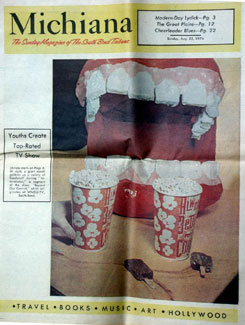 Michiana Magazine Cover, Michiana Magazine Cover,
The South Bend Tribune
| By Betti Bullock Tribune Staff Writer
THE NATION'S BEST locally produced variety television show originates in South Bend. This might surprise some, but even more surprising is the fact this program is produced by high school students.
To those who've followed locally-produced television closely, the name "Beyond Our Control" is familiar. Sponsored by WNDU-TV, Beyond Our Control (BOC) is a Junior Achievement company.
On Feb.20, 1974, the National Association of Television Program Exedutives (NATPE), named BOC the nation's best locally produced variety show in Its market class. BOC competed with professionally produced programs. There was no compensation because it was produced by high school students. NATFE's citation described the series as "outstanding variety programming actually produced by students in South Bend, that provided a new and entertaining insight into the status of contemporary American culture as mirrored by the television Industry Itself."
Beyound Our Control has achieved the kind of notoriety in the television world most programs can only dream about. Credit for BOC's success must be given to hundreds of high school students and the WNDU personnel who made the show possible.
The birth of BOC dates back to the 1967-68 school year. WNDU had been sponsoring a Junior Achievement company since 1959. In the first years the students produced programs that included panel and game shows.
Dave Williams, WNDU promotion director and one of three company advisers, said the students chosen for the company in 1967 wanted to do something different. "They wanted something elaborate. After weeks of discussion, they decided on a program that would use television as a mirror of American culture. The students had the popular TV show, 'That Was the Week That Was' in mind when they reached their final decision." he said.
Since Beyond Our Control is a Junior Achievement company, it's designed to expose high school students to a commercial enterprise. The BOC members who have glamorous visions of the television industry soon learn there's a lot of hard work involved.
Before the company can officially get under way, stock has to he sold at $1 a share. At the end of the school year the company is liquidated. Stockholders then are paid, usually receiving a 25 cent dividend for their original investment.
But advertising is the real key for BOC's success as a commercial venture. The students are exposed to the business world and soon realize they have to face that world on an equal footing with other media's advertising sales personnel. And that certainly can't be a comfortable feeling for most high school students. They also learn if they can't sell. the show won't ever get on the air.
SINCE BOC WAS A NOVEL adventure for high school students, it was viewed skeptically by some advertisers. Thomas Hamilton, WNDU general managers said "we weren't going to treat BOC any differently. They were a commercial entity and we charged them a going rate for studio use. They also used our standard advertising rate card." He realized the students would encounter some reluctance on the part of advertisers. "I'd say it has taken 10 years to educate local advertisers that this was a sincere and successful enterprise," he said.
| 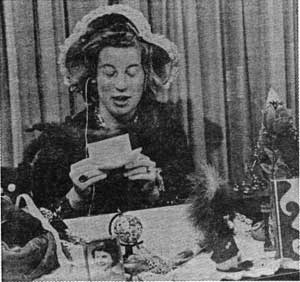 MARY KOCY STARS as hostess of Lady's Fun Time,' Beyond Our Control's version of locally produced women's daytime television programs. Mary is shown with her featured feline companion - Mr. Tom. MARY KOCY STARS as hostess of Lady's Fun Time,' Beyond Our Control's version of locally produced women's daytime television programs. Mary is shown with her featured feline companion - Mr. Tom. | Every show wants to be sold out during its season, but in the first years of BOC that only was a dream. Times have changed though. During the last three years. BOC has been a sell out, and the 1973-74 company even sold out before the show went on the air.
Sales make up one aspect of television. The scripts had to be written and writers' sessions were organized. Informal rap sessions, where any usable idea was jotted down and held.
BOC ran a total of 13 weeks as a half-hour show. That calls for development of a lot of scripts.
|
The writers were faced with a difficult task; how to effectively produce a variety-type format. They had no previous company experience, and were on their own, with Williams and WNDU-TV director Bill Siminski acting as their advisors. The first writers' sessions were hectic. One of the first decisions to be considered was whether or not they would utilize a host concept to introduce segments, like "That Was the Week That Was."
After considerable debate, Beyond Our Control's writers decided on using three hosts to open and close the program and also to provide continuity between segments.
With that decision, the writers turned their thoughts to what kind of segments they would have. Williams said, "since they chose to mirror American culture as seen through the eyes of television, they wanted to poke fun at every aspect - popular TV shows, movies, commercials and even social issues."
For example, one complete show was devoted to a filmed parody of the Winter Olympics, highlighted by such esoteric sports as mixed doubles on saucer sleds, uphill skiing, and the 400 kilowatt chaise lounge competition. It should he noted several ambitious BOC members cast in the Olympics suffered frostbite when they bravely shed their shoes for a filming sequence.
Another show presented a series of parodies on children's television shows featuring a neurotic host named "Uncle Sally," five-second cartoons, and incessant commercials for "Flax Flakes," the cereal shot from contented cows.
And they poked fun at a popular daytime show in a Valentine's Day special devoted to love. It was called the "Nearlywed Game," and featured three couples on the eve of their wedding. The nervous couples were asked insipid questions by an unbelievably persistent host.
| The best word for scripts written in the first year probably would be 4'experimental." But writing was not the only experimental aspect of BOC in its formulative years.
WNDU-TV programming was still in black and white in 1967 and the control room was lacking the sophisticated video tape equipment it has today. An entire five-minute segment taped in the studio had to be perfect because editing was impossible.
WILLIAMS RECALLED the headaches involved with those early taping sessions. "I remember a five-minute bit called "Gentle Marvin," the giant anteater. The character was created from a vacuum cleaner, and it went after all kinds of objects. One of those objects was a string of jelly beans, designed to look like ants.
| 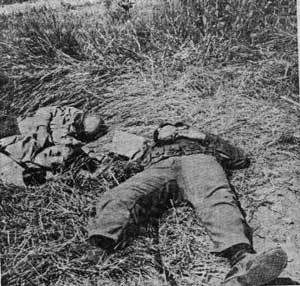 HERE'S A SCENE from "Over Where?," BOC's rendition of a typical World War II movie. HERE'S A SCENE from "Over Where?," BOC's rendition of a typical World War II movie.
|
A cast member had to pull the string across the floor, and everytime we started taping, the string broke. That little mishap was compounded by other mechanical difficulties. It took almost five hours before we finally heard the director say, "We'll take it."
Williams said BOC has gone through a seven-year transition. "Everything now is in the hands of students. They shoot film. direct, edit tapes and run audio. The only WNDU personnel involved in the show are technical engineers and advisers."
In the first few years students acted only as floor directors and prop men. WNDU personnel acted as cameramen, directors. audio men and advisers.
Hamilton commented on the transition "Since the program has been turned over to the students, its become even more valuable educationally. Beyond Our Control has a selective character of operation - their morale is what anyone could possibly desire in a business operation."
He also believes the advisers should be given a lot of credit. "Their atittitude is very important to the program's success. The students know they are totally interested and that fact gives the confidence necessary to produce an award-winning television show."
Saying the students and advisers give most of their spare time to BOC is definitely an understatement. According to Williams, the program has become a year-round venture. One of the major changes since BOC began is a summer group which has been developed in addition to the school year session.
The summer session begins at the end of May. A membership committee reviews applicants. The committee consists of three WNDU advisers and three top returning students. Almost 80 per cent of the applicants are rejected due to the limited size of the group. The project is devoted to 16 MM filming on location. Scripts have to be written before the filming begins. The company is dissolved at the end of each summer.
IN THE FALL ANOTHER company is chosen and exists until the following May. Members again are selected by the interviewing process, and approximately 30 high school students are selected. Age and geographical location aren't considered. in selecting members; according to Williams, almost 30 per cent of the 1973-74 company came from Michigan.
Three or four orientation sessions are then held. Goals, working methods and available fields of interest are discussed. Adviser Williams has written a humorous but enlightening company manual to help with orientation.
Studio training begins in early November The first audition on camera generally is a frightening experience for the novice Other company members watch their counterparts nervously sway back and forth, stutter and sometimes even faint Students also are shown around the studio and exposed to possible major fields of interest.
In early December, skits are practiced in the studio. Actors and technicians are put on a rotation basis in teams and advisers grade for efficiency. Selections for various jobs are then made
In the meantime, those interested in sales are going through training sessions led by WNDU salesman and adviser, Joe Dundon. After training is completed, the quest for advertisers begins.
A writers' committee also is being developed. Ideas are put together and filming sessions get underway.
Filming is another element of BOC that has undergone changes. Animated film sequences, which make objects appear to be moving in a continuous fashion, have been popular with the viewing audience.
Though the technical aspect of animated film isn't too complicated, it is time- consuming. A camera is fastened to a tripod and film is advanced one frame at a time. Between frames, objects are moved or reshaped. When film is projected, the action moves smoothly. According to Williams., "all that's required for success is patience." One animated sequence that runs for 45 seconds on the air requires more than 1,000 individual moves.
A popular sequence utilized to provide continuity after the host concept was abandoned is called "Intermission." Hotdogs, popcorn. cokes, and the like can he seen dancing merrily into a giant mouth.
ONE Of THE FIRST animated sequences developed by Beyond Our Control was called the "Electric Rag." The star of the show was nothing other than an electric rag. It was struck by lightening and went berserk, nearly destroying its owners and their belongings.
In the last few years the writers committee has also developed two standard stock items that can be used throughout the show's 13-week season. One of these is TV station WIMP-Channel 1. It's the typical small town station with big ideas and no money.- Scripts center around vavious aspects of Channel 1 - news casts, sportscasts and local talent programs.
The other stock item is Eisenhower High School, located in America's typical small town. By using Eisenhower as a setting, BOC comments on school life, adolescence and teenage culture.
Beyond Our Control scripts still parody TV shows, commercials and movies. BOC's own favorite from 1973-74 was a take-off of a typical situation comedy, and called "The Donna Rea Show." It was complete with an incessant laughtrack.
Another show poked fun at the popular movie, "Airport." The silent film version named "Blimport," showed a mad man with a giant pin who terrorized passengers.
While the writers are hard at work developing scripts, students interested in building studio props go through a training session led by WNDU art director and adviser, Dennis Laughlin.
At the end of December the first official taptng session is held. This will be BOC's show that starts off its season in January.
Groggy-eyed crew members (prop persons and production personnel), meet for the 6:30 a.m. studio call. The general cast call is 7:30 a.m. The session goes until 1:30 or 2 pm. without a break for lunch. This pattern is followed throughout the 13-week season. After the first taping session, BOC members sit down for an emergency meeting. Problems are discussed and analyzed.
| A typical week in the life of Beyond Our Control members consists of the following:
Monday and Tuesday - writers' meetings.
Wednesday - general company meeting, scripts are distributed, parts and props are assigned.
Thursday - writers' meeting if needed
Saturday - stuido taping session.
Sunday - filming session.
Keeping in line with its professional counterparts, BOC has its own "Academy Awards." At the end of the season company members vote on the best actor and actress, best. supporting performer, best director, technician, and so on.
| 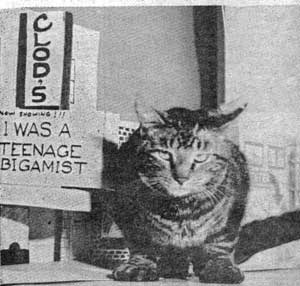
THE STAR OF BEYOND Our Control's' science fiction thriller, 'The Cat That Devoured Crumstown,' takes a brief rest before virtually destroying the city.
|
Diehard womens' rights advocates will be interested in learning sexist barriers don't exist in BOC. According to Williams, women have always held prominent positions in the company. They've served as president, technical personnel and in management positions.
Students served as directors for the first time in the 1973-74 season, and one of tha three was Diane Werts, who also found time to be the company's top salesman and a National Merit Scholar.
It's easy to understand that Beyond Our Control is invaluable for high school students interested in the communications field as a career. According to Hamilton, about 10 per cent of BOC graduates are in the communications industry today. Another 40 per cent go on to college with a broadcasting major.
| Bob Soos, a two-year BOC member, was graduated from Riley High School in 1970. He went to college as a broadcasting major at South Dakota State. He pointed out a "problem" caused by his association with BOC.
"Before I even went to college I had learned too much and became bored with my college curriculum" he said. "BOC teaches you the way it really is and college seems to stress theory." Bob left South Dakota and became a disc jockey on WNDU radio.
| 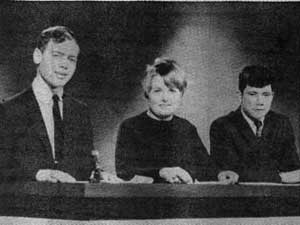
IN BOC'S FIRST YEAR, three hosts were used to open and close the show and to provide continuity between segments. From left were Tim Shaw, Kathy Kocy, and Chris Fergus.
| He then went to Daytona. Beach, Fla., landing a job at WROD radio. He's now the station's music director and air personality.
Bob commented, "joining BOC is the smartest move I ever made. Its So valuable because it delves into all aspects of television - sales, production and writing." He added BOC gave him television experience he'll be able to use later.
OTHER BOC GRADUATES interviewed made basically the same cornment, Beyond Our Control gave more practical experience than could ever be obtained In college.
BOC members and graduates can easily attest to the program's worth. During the last seven years, readers of national publications also have learned of Beyond Our Control's success as an experimental television program.
Stories about different aspects of BOC's success story have appeared in TV Guide, U.S. News and World Report, TV and Radio Mirror, Broadcasting, Notre Dame Scholastic and Educational Television. BOC has even been discussed in two of Loyola University's (Chicago) textbooks on television and film-making.
|
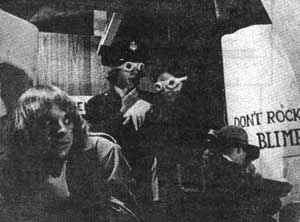
A SUSPENSE-FILLED EPISODE from BOC's full-length silent movie version of 'Airport' was called "Blimp Port" and featured a mad man who terrorized passengers with a pin.
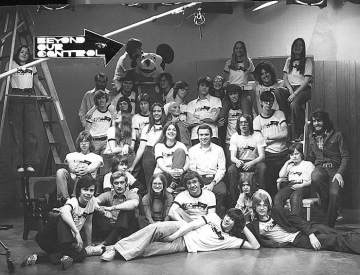
MEMBERS OF THE 1973-74 Beyond Our Control company gather in the studio far one last time, at the end of the year, to have their group portrait taken.
| And if one national award isn't enough, Beyond Our Control claims another. For the last two years, BOC has won the George Washington Honor Medal Award from Freedom Foundation at Valley Forge competitions in the Economics Educational category. The award Is for programs or projects relating to the American free enterprise, risk-capital and profit and loss systems.
| 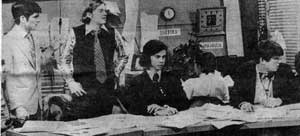
THIS WAS A SCENE from Beyond Our Control's informal live-from-the-newsroom broadcast of Channel One, TV station WIMP.
|
WNDU-TV through its sponsoring of Beyond Our Control, has destroyed the myth that local educational programming has to be dull. But even more important, it has given hundreds of high school students a realistic look at the television industry itself.
As one fan letter from a TV promotion manager stated, "It is rather commendable and lucky for those high school students that they can work out such an arrangement to get that kind of local programming on the air. The FCC probably blesses your station. And it's rather pleasant experience for the kids involved, especially those who show the singularly poor judgement to want to continue in this happy mess."
The South Bend Tribune, Sunday, August 25, 1974 | | | | |